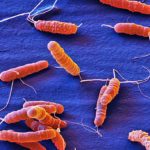Lien vers Pubmed [PMID] – 22719879
PLoS ONE 2012;7(6):e38353
The bracken fern Pteridium aquilinum is a plant known to be carcinogenic to animals. Epidemiological studies have shown an association between bracken fern exposure and gastric cancer development in humans. The biological effects of exposure to this plant within the gastric carcinogenesis process are not fully understood. In the present work, effects in the gastric mucosa of mice treated with Pteridium aquilinum were evaluated, as well as molecular mechanisms underlying the synergistic role with Helicobacter pylori infection. Our results showed that exposure to Pteridium aquilinum induces histomorphological modifications including increased expression of acidic glycoconjugates in the gastric mucosa. The transcriptome analysis of gastric mucosa showed that upon exposure to Pteridium aquilinum several glycosyltransferase genes were differently expressed, including Galntl4, C1galt1 and St3gal2, that are mainly involved in the biosynthesis of simple mucin-type carbohydrate antigens. Concomitant treatment with Pteridium aquilinum and infection with Helicobacter pylori also resulted in differently expressed glycosyltransferase genes underlying the biosynthesis of terminal sialylated Lewis antigens, including Sialyl-Lewis(x). These results disclose the molecular basis for the altered pattern of glycan structures observed in the mice gastric mucosa. The gene transcription alterations and the induced glycophenotypic changes observed in the gastric mucosa contribute for the understanding of the molecular mechanisms underlying the role of Pteridium aquilinum in the gastric carcinogenesis process.

